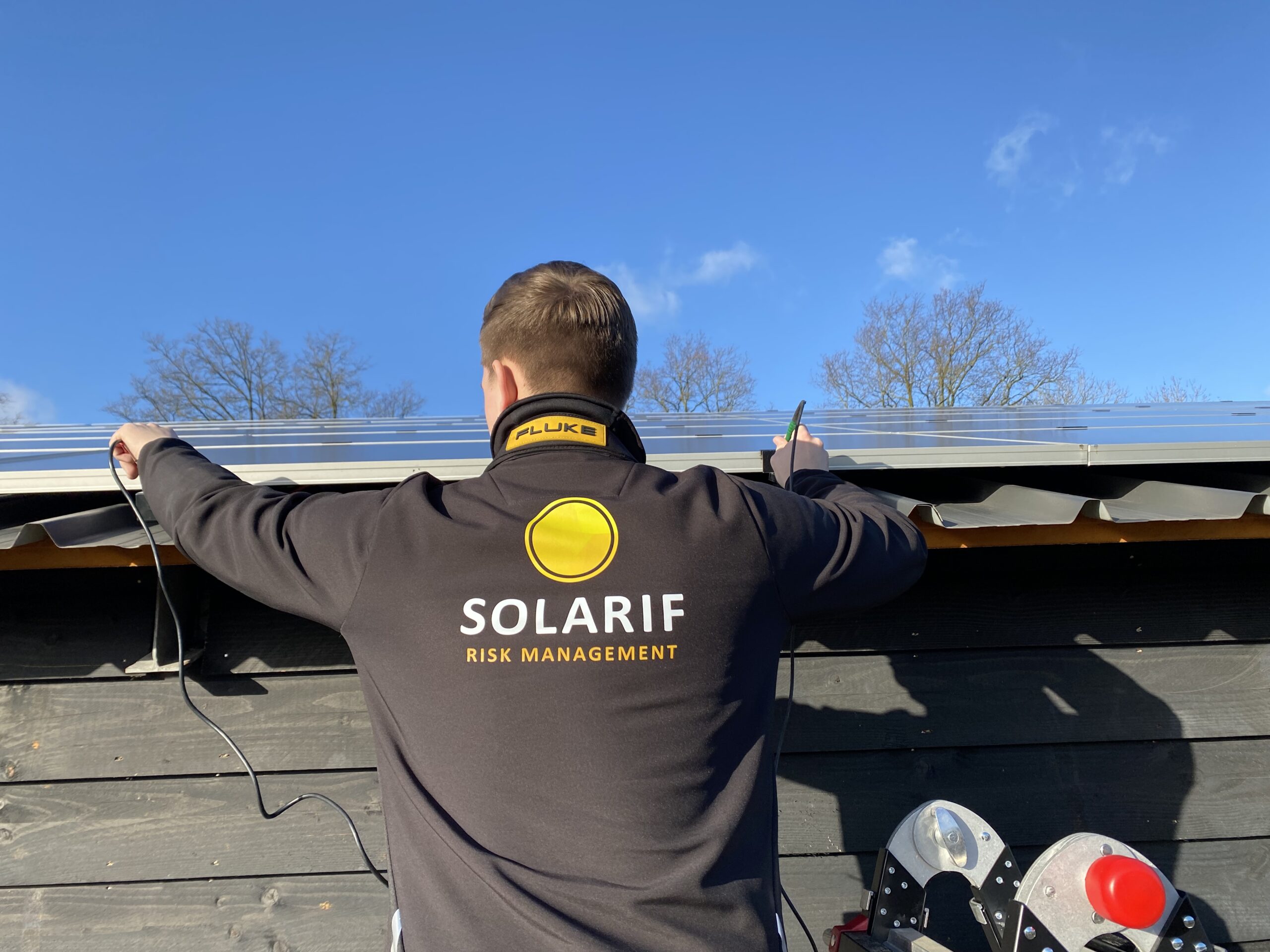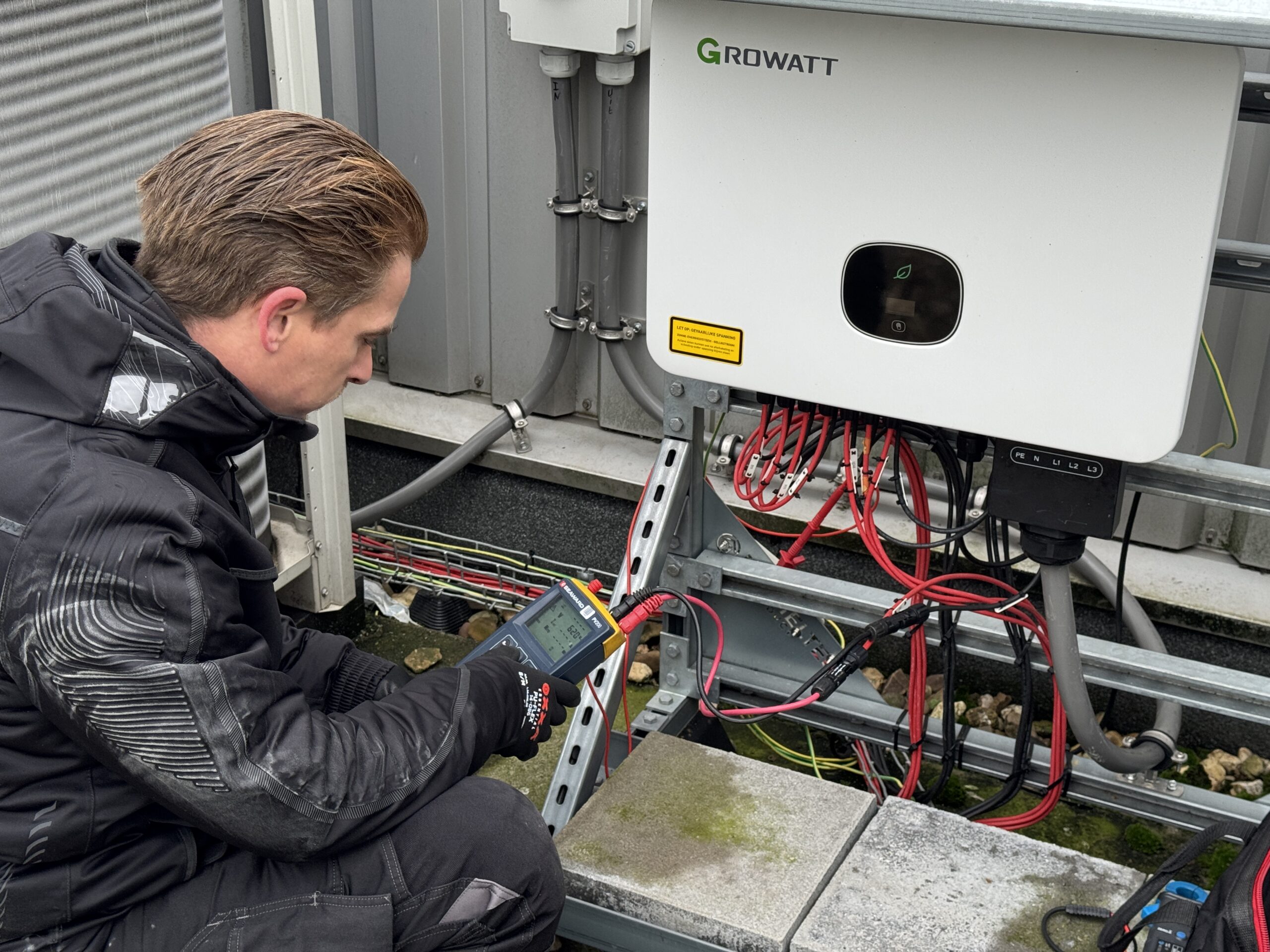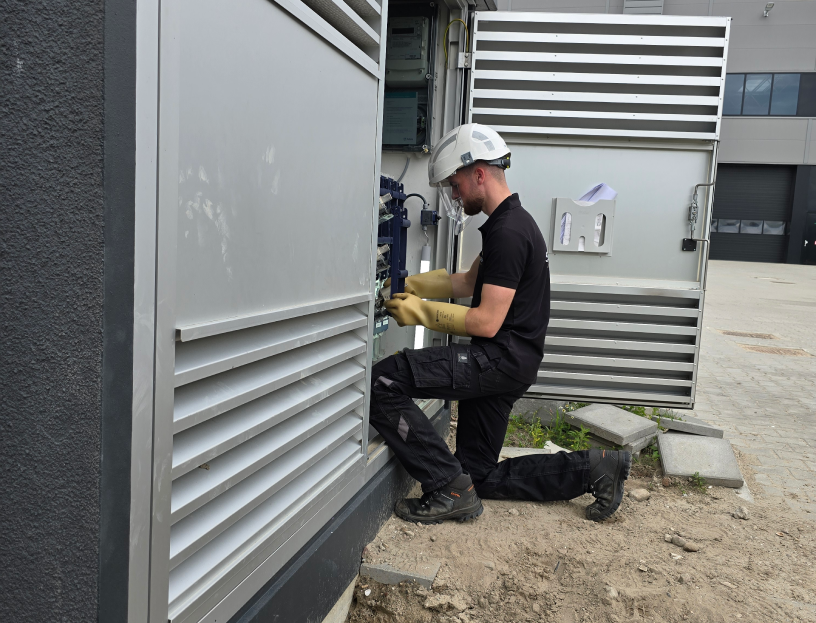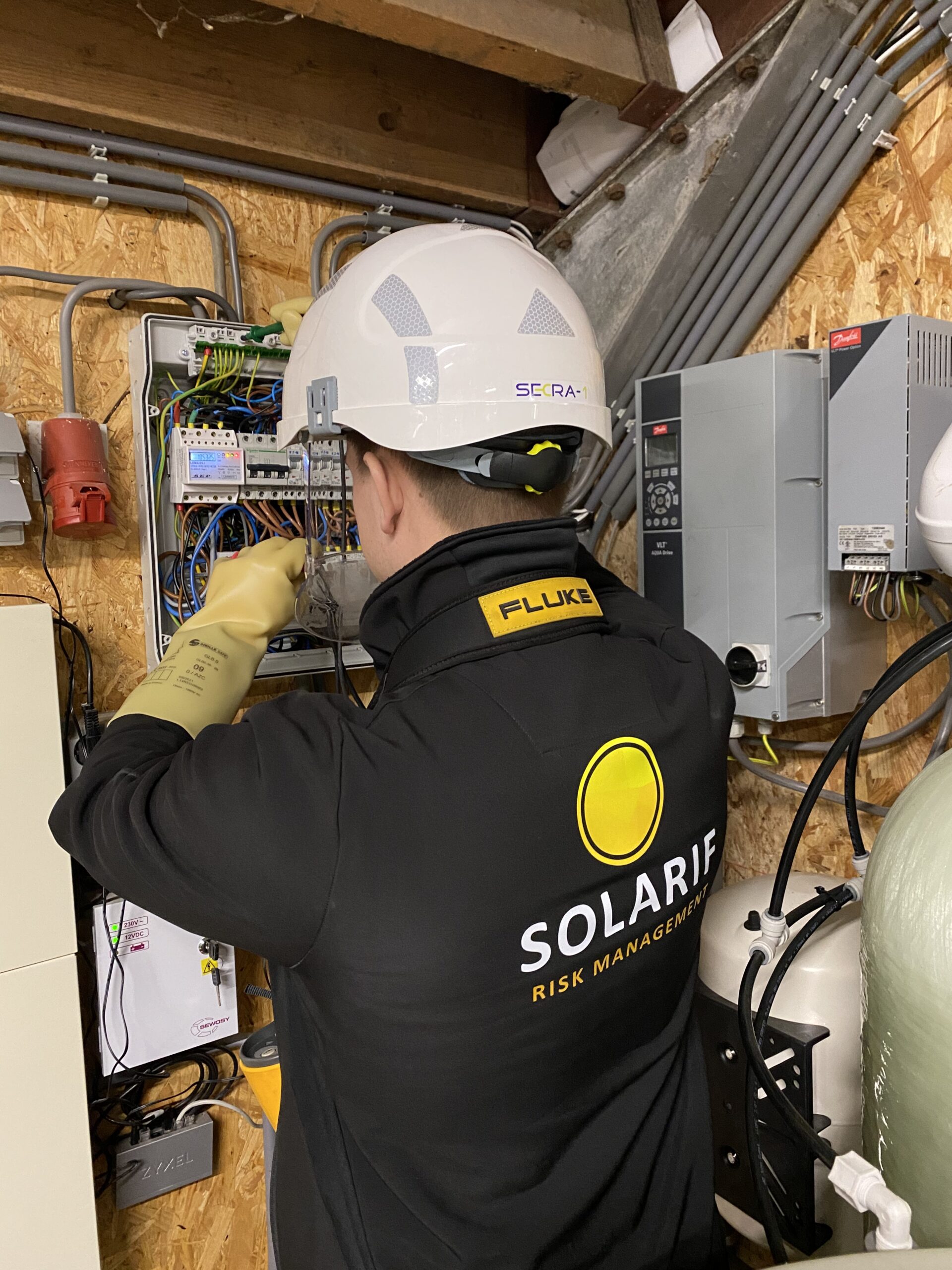What crucial points does a scope 12 inspector look for during solar panel assessment?
A Scope 12 inspection for solar panels is a comprehensive safety and quality assessment conducted by certified inspectors to evaluate commercial solar installations in the Netherlands. This inspection, specifically developed for the Dutch insurance market, focuses on electrical safety, component quality, and installation workmanship to ensure the system meets insurance requirements. A certified SCIOS (Foundation for Certification of Inspection and Maintenance) Scope 12 inspector examines electrical connections, mounting structures, grounding systems, and documentation to identify potential safety hazards or compliance issues. While not legally mandatory for all solar installations, a Scope 12 inspection is required by insurance providers before they will issue coverage for commercial solar PV projects, as insurers will not insure systems that don’t meet safety standards.

What is a Scope 12 inspection for solar installations?
A Scope 12 inspection is a specialized technical assessment that evaluates the safety, quality, and installation workmanship of commercial solar panel installations. These inspections are conducted by certified SCIOS Scope 12 professionals who thoroughly examine both the physical components and documentation of a solar PV system. The primary purpose is to verify that the installation meets established safety standards, quality requirements, and technical specifications.
This inspection follows specific standards including NEN 1010, NEN 3140, SCIOS Technical Document 18, NEN-EN-IEC 62446-1, and NEN-EN-IEC 61439. These standards focus on electrical safety, fire prevention, and the overall technical condition and quality of the installation. It’s important to note that Scope 12 is exclusively for solar panel installations and cannot be applied to other forms of renewable energy.
It’s important to understand that a Scope 12 inspection is not legally required simply to have solar panels installed. However, if you want to insure your commercial solar installation, insurers will require a successful Scope 12 inspection before providing coverage. This ensures that the system meets safety standards and minimizes potential risks. Any issues found during inspection must be resolved before insurance coverage can be obtained. While residential solar panel installations typically don’t require Scope 12 inspections, they are essential for commercial installations in an insurance context.
What safety components does a Scope 12 inspector examine?
During a Scope 12 inspection, the inspector conducts a thorough assessment of all safety-critical components of the solar installation. The evaluation focuses primarily on elements that could potentially create electrical or fire hazards if improperly installed or maintained.
The inspector examines the electrical connections throughout the system, looking for proper wire sizing, appropriate terminations, and correct insulation. They also inspect the mounting systems to verify structural integrity, proper load distribution, and resistance to natural disasters like wind and snow loads.
Grounding and earthing systems receive particular attention, as these are essential for preventing electrical shocks and fires. The inspector verifies that all grounding connections are properly installed and meet relevant standards. Fire safety measures are also assessed, including proper cable routing, use of fire-resistant materials, and adequate spacing between components.
Additionally, the inspector checks compliance with electrical codes to ensure the system meets all relevant standards and regulations. This includes verifying appropriate overcurrent protection, disconnect points, and warning labels. Learn more about the Scope 12 inspection process and how it addresses these critical safety components.

How does a Scope 12 inspector assess electrical system quality?
A SCIOS Scope 12 inspector employs a systematic approach to evaluate the electrical system quality and installation workmanship of a solar installation. The assessment begins with a thorough examination of the system’s inverters, which are critical components that convert DC power from the panels to usable AC electricity.
The inspector carefully examines all wiring and connections, looking for proper installation techniques, appropriate sizing, and signs of potential degradation. They pay special attention to connection points throughout the system, as these are common locations for failures that could lead to system inefficiency or safety hazards.
Circuit breakers and other protective devices are tested to ensure they function correctly and provide adequate protection. The inspector also evaluates how well the solar PV system integrates with the building’s existing electrical infrastructure, verifying that connections to the main electrical panel meet all safety requirements.
Testing equipment is used to measure electrical parameters such as voltage, current, and insulation resistance. These measurements help identify any anomalies that might indicate potential problems. The inspector also performs visual inspections to identify issues like improper wire routing, inadequate support for conduits, or insufficient protection from environmental factors. For larger systems (>250kW), these comprehensive inspections may take a full day or more to complete properly.
What documentation requirements are verified during a Scope 12 inspection?
During a Scope 12 inspection, verifying proper documentation is as important as examining the physical installation. The inspector reviews a comprehensive set of documents to ensure the system is properly designed, built with quality components, and compliant with relevant standards.
Installation manuals for all major components are checked to verify that the system was installed according to manufacturer specifications. Component certificates for panels, inverters, and other equipment are examined to confirm they meet quality and safety standards. The inspector will also review the system design documentation: to ensure it was properly engineered for the specific application and location.
Compliance with local regulations and standards is carefully verified through examination of permits, approvals, and certification documents. The inspector checks that electrical diagrams accurately represent the installed system and that maintenance records demonstrate proper upkeep of the installation.
For rooftop installations, the inspector checks whether a structural load calculation is available, demonstrating that the roof can safely support the added weight of the PV system, including snow and water accumulation. While the inspector does not perform structural calculations themselves, they do verify that these critical safety aspects have been properly considered and documented.
Additional documentation such as warranty information, commissioning test results, and operation manuals are also reviewed. This comprehensive documentation check ensures that the system not only functions safely today but can be properly maintained throughout its operational life.
Why is a Scope 12 inspection mandatory for solar panel insurance?
Insurance providers require Scope 12 inspections for commercial solar installations because they provide a standardized assessment of risk before issuing coverage. These inspections help insurers evaluate the safety, quality, and compliance of installations, allowing them to make informed underwriting decisions.
From a risk management perspective, Scope 12 inspections identify potential hazards before they cause damage or system failure. By requiring these inspections, insurers can significantly reduce their exposure to claims resulting from preventable issues like electrical fires, equipment damage, or system underperformance.
It’s important to understand that Scope 12 inspections are mandatory for insurance as a prerequisite for standard coverage at normal premiums. Without a successful Scope 12 inspection, commercial solar installations may only obtain insurance at higher premiums or with restrictive conditions, if at all, as insurers will not cover systems with unverified safety standards.
Insurers rely on these inspections to verify that installations meet industry standards and best practices, which helps them manage their portfolio risk. For system owners, the inspection provides valuable information about system quality while enabling them to secure the insurance coverage necessary to protect their investment.

Understanding the difference between manufacturer warranties and insurance coverage
When investing in solar PV systems, it’s crucial to understand the limitations of manufacturer warranties. Manufacturer warranties typically only cover defects in the product itself, but do not cover consequential losses. For example, if a panel fails, the warranty might replace the panel, but you’ll still be responsible for transport costs, labor for removal and installation, and any business interruption losses. Additionally, if the manufacturer goes bankrupt, their warranty becomes worthless.
In contrast, insurance with inherent defect coverage operates at the project level. This coverage remains valid even if the manufacturer no longer exists and importantly, it covers consequential damages. This means that not only is the defective component replaced, but the costs associated with that replacement (labor, transport, business interruption) may also be covered depending on your policy.
Insurance coverage becomes particularly valuable for commercial installations where system downtime can result in significant financial losses. For these high-value systems, comprehensive insurance that includes protection against natural disasters, theft, vandalism, and inherent defects provides essential financial security beyond what any warranty can offer.
To obtain this comprehensive insurance coverage, insurers require evidence that the system meets safety and quality standards, which is precisely what a Scope 12 inspection provides. Without this certification, insurers may decline coverage or offer it only with higher premiums or restrictive terms.
What happens after a Scope 12 inspection is completed?
After completing a Scope 12 inspection, the inspector prepares a detailed report documenting their findings. This comprehensive report outlines any identified issues, categorizing them by severity and providing clear recommendations for remediation where necessary.
If deficiencies are found, the system owner will need to address these issues before receiving certification. The remediation process may involve making physical changes to the installation, updating documentation, or both. Once all required corrections have been made, a follow-up inspection may be necessary to verify compliance.
Upon successful completion of all requirements, the inspector issues a formal certification indicating that the solar installation meets the necessary standards for insurance purposes. This certification document is then provided to insurance brokers or providers as proof of compliance.
Insurance providers use the inspection results to determine insurability and coverage terms. The certification typically remains valid for a specific period (often 5 years), after which a re-inspection may be required to maintain insurance coverage. If any modifications have been made to the system in the meantime, an earlier inspection may be necessary. In certain cases, insurers may require Scope 12 inspections to be performed earlier than the standard five-year interval, particularly for commercial buildings where business activities are of high value and where interruption (such as from a fire caused by the solar panel system) would cause significant financial losses. Roofs with solar installations present a higher risk profile compared to roofs without such systems.
When should you schedule a Scope 12 inspection?
Following significant weather events that may have impacted your installation, such as severe storms, lightning strikes, or hail, a Scope 12 inspection can identify damage that might not be immediately visible but could affect system safety or performance.
Insurance renewal periods often trigger the need for updated certification. Many insurance providers require recent Scope 12 certification when renewing commercial solar insurance policies.
Even without these specific triggers, periodic Scope 12 inspections (typically every 5 years) represent best practice for system owners seeking to ensure their installations remain safe and compliant. System owners should keep the inspection report and certification as part of their permanent system documentation, as it provides valuable information for future maintenance and modifications.
While the entire process from initial scheduling to issuance of the inspection certificate is ideally completed within 2 to 4 weeks, current market conditions tell a different story. Due to a significant shortage of qualified Scope 12 inspectors, actual lead times can now extend up to several months, depending on the availability of certified SCIOS Scope 12 inspectors at the SCIOS-certified inspection company.

The importance of specific scope combinations for solar PV systems
For comprehensive safety assessment of solar PV systems combined with electrical installations which are operated by employees, certain scope combinations are particularly relevant. The combination of Scope 8 (Electrical installations focused on safety for employees) and Scope 12 (Photovoltaic installations) is essential for evaluating how solar PV systems connect to the existing electrical infrastructure.
Similarly, combining Scope 10 (Fire safety inspection for electrical installations) with Scope 12 provides a thorough assessment of electrical installations and PV installations with fire risk. This combination is crucial as fire safety represents one of the most significant concerns for insurers of electrical and PV systems.
For battery storage systems connected to PV installations, the combination of Scope 8, Scope 10, and Scope 12 is particularly important. This combination addresses both fire risks and other safety concerns unique to battery storage systems, such as thermal runaway, electrical safety, and proper integration with the PV system.
Conclusion: Protecting your solar investment
For commercial solar project owners seeking to ensure their systems meet all safety and quality standards, scheduling a professional Scope 12 inspection is an essential step in protecting their investment. A thorough inspection evaluates fire safety, technical condition of the installation, and quality of the installation work, all critical aspects that must be recognized by both SCIOS and insurance companies.
Want to know more? Contact us!
Contact us for your required Scope 8, Scope 10 and Scope 12 compliance inspection. With more than 1,000 Scope 12 inspections completed, our certified SCIOS Scope 12 inspectors have the expertise to help you meet insurance requirements and maintain the safety and performance of your solar PV investment.
📧 Email: support@solarif.com
☎️ Phone: +31 (0)26 711 5050




